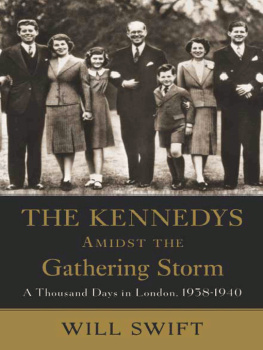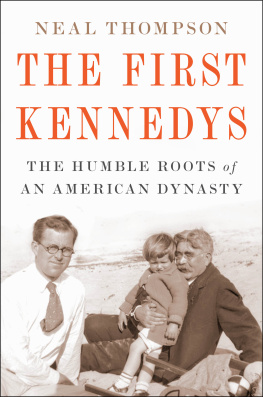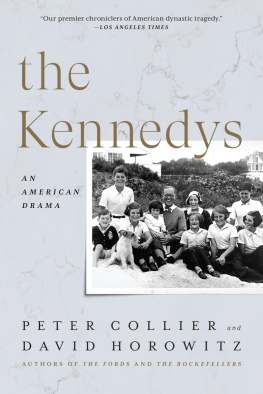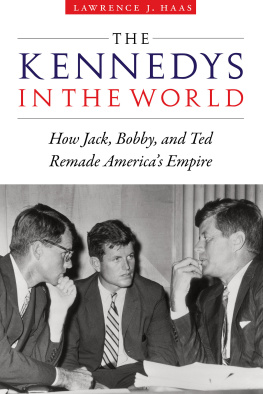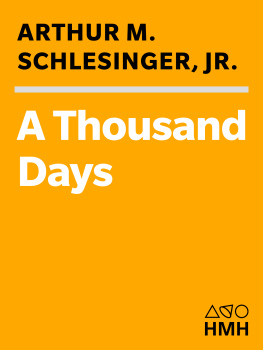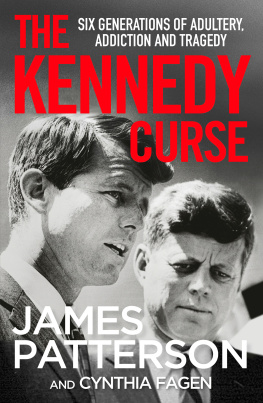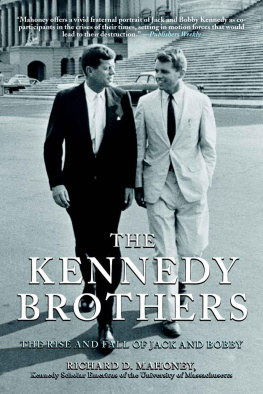O VER A FOUR-YEAR PERIOD, I spent countless hours in the John F. Kennedy Library research room, with its magnificent view of Dorchester Bay. I am grateful to the Joseph P. Kennedy Papers Donors Committee for granting me permission to study Joseph P. Kennedys restricted papers and to the John F. Kennedy Library Foundation for permission to publish private photographs of the Kennedy family.
Megan Desnoyers was extremely helpful in guiding me through the Rose Kennedy papers, showing me Rose Kennedys marvelously detailed London diaries (with newspaper cuttings pasted in); Kathleen Kennedys London diaries, which have never been drawn upon before; and newly available family letters. Stephen Plotkin, Sharon Kelly, Michael Desmond, and Frank Rigg were friendly, efficient, and resourceful in solving problems for me (and they tried to help me curtail my bad habit of licking my fingers while thumbing through piles of documents). Mary Rose Grossman went beyond the call of duty in helping me choose a rich selection of photographs and track down their copyrights. Allan Goodrich was able to identify the copyrights of some of the most obscure pictures. Jennifer Quan helped me obtain approval from the John F. Kennedy Library Foundation for photographs and research materials.
Deborah Mitford, the Dowager Duchess of Devonshire, kindly invited me to Chatsworth, and spoke to me at length on several occasions about the Kennedys during the years when the Mitfords lived around the corner from them. Her assistant Helen Marchant was also very thoughtful; they assisted me in finding photographs from that era. The countess of Sutherland shared her memories over lunch at her London townhouse, and Lady Sarah Baring Astor talked to me about her mother-in-law, Nancy Astor, and the Kennedys. Page Huidekoper Wilson, Joes young assistant at the U.S. embassy in London, who has completed her own memoir, Shot in the Tail with Luck , regaled me over tea at her Georgetown home with lively stories from her book.
The community of Kennedy scholars was extremely welcoming and supportive. I could not have written this book without Amanda Smiths brilliantly edited Hostage to Fortune: The Letters of Joseph P. Kennedy as a touchstone. Her essay on the ambassadorial period was invaluable. She was exceedingly generous with her time and knowledge. Senator Ted Kennedy was kind enough to take the time out of his extraordinarily busy schedule to talk with me, and sent me a wonderful photograph of himself and his father in London. Melissa Wagoner in his office is one of those delightful people who seems to make everything flow easily. Kennedy speechwriter Ted Sorensen graciously spoke to me about President Kennedy. His comments about the effect of Joe Kennedys ambassadorship on Jack Kennedys presidency were extraordinarily helpful. Robert Kennedy, Jr., gave me permission to look at the Lem Billings papers.
David Nasaw, who is writing a Kennedy familyauthorized biography of Joseph P. Kennedy, was unfailingly generous and helped me arrange important interviews. Sally Bedell Smith gave me crucial assistance and emotional support along the way, and also inspired me with her books on Pamela Harriman ( Reflected Glory ) and the Kennedys ( Grace and Power ). Discussing the Kennedy family and twentieth-century history with Lance Morrow was a marvelous experience. Charles Higham provided many useful leads and significant encouragement throughout this project. He opened his papers to my assistants and directed me to researchers in England. Bob Self was extraordinarily good-hearted and thoughtful; he answered several difficult research questions for me and painstakingly reviewed the manuscript for minor errors. His superb biography of Neville Chamberlain provided an essential background for this book. Michigan State historian Jane Vieth, who is writing her own book on the Kennedy ambassadorship, kindly read the manuscript and gave me feedback. Anne de Courcy caught several key errors in the text. Allen Packwood of the Churchill archives pointed me to the unpublished correspondence of Unity Mitford and Winston Churchill, helped me shape my early ideas about Churchill, and also read the manuscript. Blanche Weisen Cook was particularly helpful regarding matters related to Jewish refugees. Conrad Black provided insights along the way, and Doris Kearns Goodwin also gave me assistance.
Robert Holmes Tuttle, President George W. Bushs ambassador to the Court of St. Jamess, spoke with me at the U.S. embassy in Grosvenor Square about the responsibilities and challenges an American ambassador faces in London. His assistant Maureen Malloy was particularly obliging. Peter Hilton arranged for me to have a tour of Princes Gate, which I greatly enjoyed. Claire Jackson, the college archivist at the Royal College of General Practitioners at Princes Gate, assisted me with photographs.
I am grateful for conversations and communications with Robert Dallek; James McGregor Burns; Evan Thomas; Stephen Wises grandson Steve Tulin; Jane Ormsby-Gore Rainey; Burton Hersh; Andrew Roberts; Ed Klein; Laurence Leamer; Ed Renehan; Sylvia Morris; Lynne McTaggart; Angela Lambert; Nigel West; Andrew Parker-Bowles; Christopher Sykes; Sir Ronald Grierson; Pamela, Lady Harlech; Victoria Ormsby-Gore Lloyd; Lady Anne Tree; Lady Elizabeth Cavendish; Katherine MacMillan; Shaul Ferraro at Yad Vashem; Richard Whalen; Lord Astor; William Shawcross; Gore Vidal; Sarah Bradford; Hugo Vickers; and Kenneth Rose. I received valuable assistance from the staff at Cliveden, at the Astor archives, at the Beaverbrook archives at the House of Commons, and from the Department of Special Collections, SUNY Library, Stony Brook, New York. Marvin Russell at the National Archives in Maryland; Christine Kitto at the Krock Papers in the Seeley G. Mudd Manuscript Library in Princeton, New Jersey; Nicholas Scheetz and Scott Taylor at the Special Collections Division of the Georgetown University Library; Lynn Duchez at the Cleveland Public Library Special Collections; and Nancy Fulford at the Astor Archives all went out of their way to help me. Philip Parkinson did research for me in London. And my local librarians Jean Pallis (in Valatie) and Julie Johnson (in Kinderhook) were unfailingly generous to me.
I hope that any contributors I have forgotten to mention will understand how much I appreciate their help despite my temporary memory lapse.
Researching a book is always an adventure: Some uninspiring avenues bear unexpected dividends, while other more promising paths suddenly stop cold. Amanda Smith told me that Joe Kennedys journalist friend George Bilainkin had written a private memoir about the ambassadorship, Joseph P. Kennedy: A Fateful Embassy . Excited about reading this firsthand account, I hired the talented British researcher Philip Adriaan, on Charles Highams advice, to track down Bilainkins descendents and recover the manuscript. Working with obituaries, he determined that George was a member of the Royal Commonwealth Society and searched their files for information. He also made use of ancestry websites, and finally located Bilainkins granddaughter Jan Dziewulski. She told him that her parents had, indeed, found Georges manuscript while they were going through his possessions after he died. Jans mother told her that the manuscript wasnt finished and since he was getting ultra-paranoid by that time, the manuscript was rambling and incoherent so she binned it. Tantalizingly, she also told her that her fathers intimacy with the Kennedys would have made the manuscript very interesting if he had still had his marbles while he was writing it. I found it painful that this potentially important document has been lost to history.

